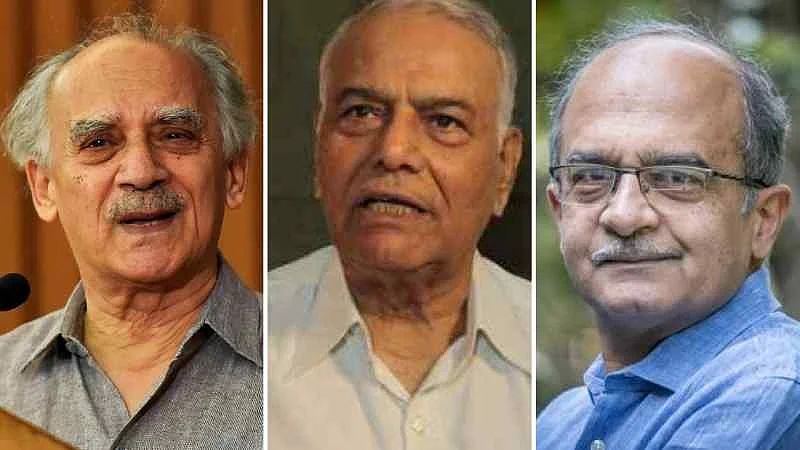Media Coverage (Or Lack of It) of Rafale Presser by Shourie, Sinha
We analyse how media covered Arun Shourie, Yashwant Sinha and Prashant Bhushan’s allegations against the Rafale deal

advertisement
Two former Bharatiya Janata Party (BJP) Cabinet ministers and a well-known activist-lawyer call the Rafale deal a 'monumental criminal misconduct' orchestrated by the ruling government.
Sounds like a big deal? It probably is, especially since the allegation is that it concerns national security and could cost the public Rs 35,000 crore.
The Quint analyses how – with mics of around 15 media houses and a well-packed audience present – the media covered the 8 August press conference that raised questions about the controversial arms deal with France.
The Allegations
- The number of aircraft was reduced from 126 to 36 unilaterally by the prime minister.
- Hindustan Aeronautics Limited (HAL), which has experience in building defence equipment, was removed and Reliance was introduced as the offset partner, in spite of having no experience.
- At the time when it signed the Rafale deal, Reliance Defence, a year-old company, had a debt of Rs 8,000 crore, and had an accumulated loss of Rs 1,300 crore.
- The price of each aircraft has gone up from Rs 670 crore to Rs 1,660 crore.
One Newspaper Fronts the News, Others BURY it
The only newspaper to lead with the story on its front page was The Telegraph, with the headline “Rafale deal explodes on ‘one person’” giving the story almost the entire space above the fold.
However, this can't be said about other newspapers.
The Indian Express published the press conference with the headline: "Shourie, Sinha allege Rafale scam; not a grain of truth, says Jaitley" on page 8 as the second lead. The Times of India reserved the press conference for page 9, with the headline: “Sinha, Shourie demand CAG 'forensic' audit on Rafale deal”. Hindustan Times chose to write about the press conference leading with Arun Jaitley's response to the allegations. The headline, which can be found on page 12, read, "Jaitley rubbishes allegations on Rafale deal". It was not the first or the second lead on the page.
The Quint went live with the press conference on Facebook, so did The Wire Hindi. While The Economic Times had a copy published online on the day of the press conference itself, embedded with a video of it aired on ET Now, the conference was not published in the newspaper.
The Scroll also repeatedly tweeted points raised by the three-member panel and published the full text, as did The Wire. The Quint published a news report at the time of the news conference and published a separate copy the next morning. The Print had a news story from the event without a video, but it didn't live tweet the event.
For news channels, covering the press conference, which was slated for 4:00 pm, would mean cutting away from the live telecast of Kalaignar Karunanidhi's last journey to Marina beach. Hence, we have looked at the prime time coverage of the press conference across news channels.
News TV ‘Primetime’ too Precious to Spend on Rafale?
The only news channels to dedicate primetime to the Rafale deal were NDTV 24X7 and NDTV India. While at 9:00 pm, Nidhi Razdan had a debate on what would follow for Tamil Nadu politics after Karunanidhi's demise, at 10:00 pm, Vishnu Som took over to discuss the Rafale deal with former BJP ministers, Prashant Bhushan and Yashwant Sinha. NDTV Hindi's Ravish Kumar also spent primetime discussing the allegations.
News 18, for their Faceoff at 8:00 pm, had a debate on if MK Stalin can uphold Karunanidhi's legacy? Viewpoint, which followed at 9:00 pm, focused on the nuisance and disruption to law and order caused by kanwariyas. The only coverage of the event was a PTI copy, automatically produced at 10:00 pm with the headline “Bofors Pales into Insignificance Before Rafale 'Scam', Allege Yaswant Sinha, Arun Shourie”.
India Today, with its primetime programme IndiaFirst, covered the kanwariya issue and had a farewell episode on Karunanidhi anchored by Rajdeep Sardesai. They also, like News18, published the same PTI copy of the press conference and published Jaitley's Facebook blog against the allegations.
Times Now put out a copy and embedded it with a video from the channel a day later. The video had the time stamp of 8:50 am, showing it was aired the following morning (9 August). It included the counter by Arun Jaitley.
Republic TV had three separate debates, none of which were on the revelations made by former BJP ministers Sinha and Shourie. The third debate was the UPA Boeing Deal, the second one was on if the AIADMK was being vindictive to not allow Karunanidhi's remains to rest at Marina beach, and the first debate was on Bihar CM Nitish Kumar sacking Manju Verma.
Is the Media Truly Independent?
A senior journalist recalled how earlier press conferences by politicians, especially dissidents and the Opposition, were generously covered by media houses, but now, they're covered less than adequately.
In a letter on the ABP news controversy, The Editors Guild of India said media editors should and will not be sat upon. But when facing a clear situation in which they could exhibit their editorial independence and give space to serious warning bells raised by two former BJP ministers, dare we say these media editors were found wanting.
(At The Quint, we question everything. Play an active role in shaping our journalism by becoming a member today.)